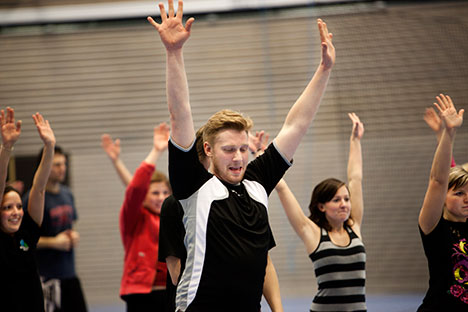Gym Culture Likened to McDonalds

Gym Culture Likened to McDonalds The University of Gothenburg
A new study explores how the fitness industry in many ways resembles that of fast food. One of the authors is from the University of Gothenburg.
McDonaldisation of the gym culture is the theme of an article published in Sports, Education and Society, where Thomas Johansson, professor at the University of Gothenburg, together with Jesper Andreasson, senior lecturer at the Linnaeus University, have explored the development of the modern fitness concept. The study is partly based on interviews with personal trainers and group fitness instructors.
14 000 gyms across the world
With the example of the company Les Mills, established in New Zealand in the 1960s, the authors describe the emergence of a strictly regulated and globalised culture in the field of group fitness training. Les Mills – a giant in the fitness industry – operates based on a franchise model where permission to use the company’s programmes is sold across the whole world. Today, over 14 000 gym offer a Les Mills programme. The company is represented in over 80 countries, including Sweden, and caters to over four million fitness class participants every week.
Strictly regulated movements
‘Les Mills implies a standardised set of techniques that look basically the same in all forms of group fitness training. It’s really a business empire built around group fitness,’ says Johansson.
The concept consists of the company’s head trainer presenting strictly regulated movements, including which music should be played while they are performed. The instructions are updated every three months and then spread throughout the whole chain of certified Les Mills instructors. As a result, local instructors have a very marginal influence over the fitness classes they lead.
Limits utilisation of competence
‘This of course limits the individual instructors’ chances of tapping into their full competence, as they have no way of changing the movements, music or the way they give instructions. Their abilities are not fully utilised since they have to adhere so strictly to a pre-designed terminology and choreography. At the same time, individual gyms often promote the whole thing as a quality index,’ says Jesper Andreasson.
This summer, the authors will publish a book titled The Global Gym. Gender, Health and Pedagogies (Palgrave Macmillan).
Read the article Doing for Group Exercise What McDonald's Did for Hamburgers: Les Mills and the Fitness Professional as Global Traveler in Sports, Education and Society – http://www.tandfonline.com/doi/abs/10.1080/13573322.2014.885432#.U1ZslyTJ4Xy
For more information:
Thomas Johansson, Department of Education, Communication and Learning, University of Gothenburg, thomas.johansson.2@gu.se, +46 (0)31 786 2003
Jesper Andreasson, Department of Sport Science, Linnaeus University, jesper.andreasson@lnu.se, +46 (0)702 585678
http://ufn.gu.se/english/News/newsdetail//-gym-culture-likened-to-mcdonalds.cid1…
Media Contact
All latest news from the category: Health and Medicine
This subject area encompasses research and studies in the field of human medicine.
Among the wide-ranging list of topics covered here are anesthesiology, anatomy, surgery, human genetics, hygiene and environmental medicine, internal medicine, neurology, pharmacology, physiology, urology and dental medicine.
Newest articles

Bringing bio-inspired robots to life
Nebraska researcher Eric Markvicka gets NSF CAREER Award to pursue manufacture of novel materials for soft robotics and stretchable electronics. Engineers are increasingly eager to develop robots that mimic the…

Bella moths use poison to attract mates
Scientists are closer to finding out how. Pyrrolizidine alkaloids are as bitter and toxic as they are hard to pronounce. They’re produced by several different types of plants and are…

AI tool creates ‘synthetic’ images of cells
…for enhanced microscopy analysis. Observing individual cells through microscopes can reveal a range of important cell biological phenomena that frequently play a role in human diseases, but the process of…





















